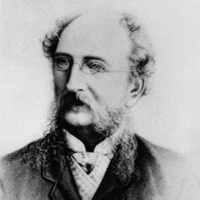On a Fork of Byron’s
Like any other fork.—No mark you meet with
To point some psychological conceit with.
An ordinary fork. A fork to eat with.
No individuality of fashion:
No stamp of frenzy fine, or poet-passion;
An article in no respect Parnassian.
No muse “with ivy never sere” hath decked it:
In fact, it would be foolish to expect it.
I question if the muses recollect it.
A plain straightforward fork; yet interesting,
As to the world in general attesting
That poetizing hinges on digesting.
A fork not standing on its merits merely,
But, being Byron’s, testifying clearly
That verse and victuals are related nearly.
Quite genuine; crest and all; a fork to swear by;
Some poet-stories doubtless hanging thereby,—
Associations such as gold can ne’er buy.
For 'twixt the fork and the divine afflatus
The links are perfect; there is no hiatus;
Fork, stomach, brain, pen,—all one apparatus.
So when the food that on the fork ascended
Grew into verse as with the brain it blended,
The fork wrote just as truly as the pen did.
For though the fork the earlier resource is,
Between the two no violent divorce is,—
I hold them to be correlated forces.
Perchance the unsuspected ministration
Of this same fork first set in circulation
The coinage of his rich imagination.
Perchance this very fork could give the clue to
What many of the famous thoughts were due to,
That now are part of me, and part of you too.
And if its prongs administered the fuel
That working duly unto brain-renewal
Kindled the thoughts that even yet fire you all,—
This very fork—(unless I quite astray be,
And you of unimpressionable clay be)—
A factor in your moral product may be.
And musing thus, does not this fork begin to you
To seem as consanguineously akin to you
As if the bard himself had stuck it into you?
’Tis ever thus: what Genius consecrateth
The nearest with the most remote collateth,
Till meanest use on highest issue waiteth.
This salad, now, in which the fork I’m pressing,
Wherein are all sweet savours coalescing—
What subtle shoot of genius efflorescing
Flowered in the flavour of so rich a blessing?
Is it that Byron’s fork, some charm possessing,
Transmutes the—stop a bit—Who did the dressing?

